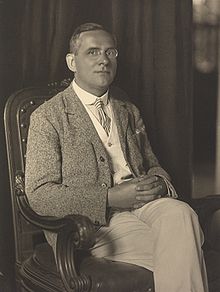Moritz Schlick
German philosopher (1882-1936)
Friedrich Albert Moritz Schlick (April 14, 1882 – June 22, 1936) was a German philosopher, physicist and the founding father of logical positivism and the Vienna Circle.

| This article about a philosopher is a stub. You can help out with Wikiquote by expanding it! |
Quotes
editAllgemeine Erkenntnislehre, 1925
editMoritz Schlick, Allgemeine Erkenntnislehre, Berlin 1925,
- The 'physical' does not mean any particular kind of reality, but a particular kind of denoting reality, namely a system of concepts in the natural sciences which is necessary for the cognition of reality. 'The physical' should not be interpreted wrongly as an attribute of one part of reality, but not of the other ; it is rather a word denoting a kind of conceptual construction, as, e.g., the markers 'geographical' or 'mathematical', which denote not any distinct properties of real things, but always merely a manner of presenting them by means of ideas.
- p. 27 i. ; as cited in: Adam Schaff (1962). Introduction to semantics, p. 83
- Philosophy is not a system of propositions, and not a science.
- p. 157 ; As cited in: Thomas Uebel (2012). Empiricism at the Crossroads: The Vienna Circle's Protocol-Sentence. p. 78
- Philosophy... is that activity by which the meaning of propositions is established or discovered. Philosophy elucidates propositions, science verifies them. In the latter we are concerned with the truth of statements, but in the former with what they actually mean.
- p. 157 ; As cited in: Uebel (2012:78)
Quotes about Moritz Schlick
edit- The members of the Vienna Circle (Moritz Schlick, Rudolf Carnap, Philipp Frank, Hans Hahn, Herbert Feigl, Fritz Waismann, Kurt Godel, Otto Neurath and others) are working out a ‘Logical Empiricism’. Following Mach and Poincare, but above all Russell and Wittgenstein, all the sciences are treated uniformly. Carnap’s Logischer Aufbau der Welt (1928) shows in which direction future systematic work will move. Wittgenstein’s Tractatus Logico- Philosophicus (1921) clarified, among other things, the position of logic and mathematics; besides the statements that make additions to what is meaningful, there are the ‘tautologies’ that show us which transformations are possible within language. By its syntax the language of science excludes anything that is meaningless from the very beginning.
- Otto Neurath (1931) "Physicalism." in: Otto Neurath (1983) Philosophical Papers 1913-1946, R.S. Cohen and M. Neurath (eds.), Dordrecht: Reidel. p. 52. Lead paragraph
- Schlick ( [Wende] p.8 ) interprets Wittgenstein's position as follows: philosophy "is that activity by which the meaning of propositions is established or discovered" ; it is a question of "what the propositions actually mean. The content, soul, and spirit of science naturally consist in what is ultimately meant by its sentences; the philosophical activity of rendering significant is thus the alpha and omega of all scientific knowledge".
- Rudolph Carnap (1934/37), Logical Syntax of Language, p.284
- The Vienna Circle was a discussion group of philosophically interested specialists who came together in 1923 and from 1925 to 1936 met regularly once a week in an institute of Vienna University. These gatherings were conducted by Moritz Schlick, the physicist and philosopher who was appointed professor of the philosophy of inductive sciences in 1922. Over the years, members included Hans Hahn, Otto Neurath, Philipp Frank, Viktor Kraft, Herbert Feigl, Friedrich Waismann, Rudolf Carnap, Kurt Godel, Karl Menger, Bela Juhos and others. There was no conscious aim of radically revising traditional views on the task and place of philosophy, but the members were on the whole well aware that current findings of research into the foundations of logic, mathematics and the natural sciences had important philosophic consequences. Among subjects for discussion were Wittgenstein's Tractatus, the possibility of reducing all concepts of science to what is directly given in experience, the setting up of a criterion of meaningfulness for non-logical utterances, the character of the basic propositions of empirical science, and the devising of a meta-language for the syntactic analysis of scientific language systems.
- Marie Neurath and Robert S. Cohen (eds.) in: Otto Neurath, Empiricism and Sociology, edited by Marie Neurath and Robert S. Cohen. Dordrecht-Holland/Boston-USA: D. Reidel Publishing Company, 1973.